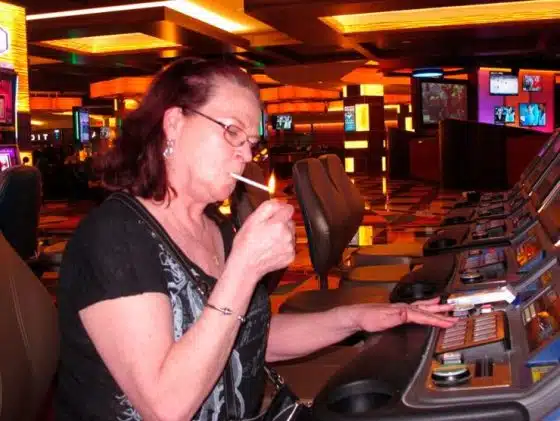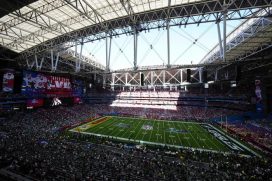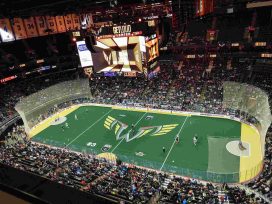Patrick Causey, on Twitter @PhillySportsJD
When the Philadelphia Eagles named Chip Kelly as the head of player personnel in December of last year, many fans and media members waited with baited breath to see what the mad scientist would cook up. Because if there is one thing we have learned while watching Kelly coach over the last two years, it's that conventional wisdom will become an afterthought if it does not coincide with his world view. Kelly marches to the beat of his own drum, and doesn't give a d*mn about what you think.
But even those closest to Kelly had to be surprised at the complete and dramatic roster overhaul that occurred. Kelly took a buzzsaw to a team that won the 8th most regular season games over the last two seasons, jettisoning mainstays like LeSean McCoy, Nick Foles, and Evan Mathis in the process.
Kelly has proven his chops as a head coach.The Eagles have gone a collective 20-12, with an NFC East divisional title under Kelly's lead. He has revolutionized the game by simplifying play calling, running an up-tempo no huddle attack and being at the forefront of sports science and technology to monitor and improve players' health.
But being a successful NFL coach does not guarantee success as a head of player personnel. Far from it. The two jobs require discrete skill sets that many people on Earth simply do not possess simultaneously. For every Bill Belichick in league history, there are 10 coaches who could not handle the dual role of serving as the general manager.
It's too early to tell whether Kelly will be able to succeed in both roles. But make no mistake: Kelly has taken considerable risks, bucking conventional wisdom and history while completely overhauling the roster to fit his image.
Let's analyze some of the critical decisions Kelly has made this offseason, good and bad.
Roster Turnover
Kelly's complete overhaul of the Eagles' roster in one offseason is a risky proposition.
A recent study done by NFL.com suggests that the most successful teams in the NFL have roster continuity for a two year window: the Packers, Seahawks, 49ers and Patriots were at or near the top of that list. At the bottom? The Jaguars, Rams and Bucs.
This is not to say roster turnover can be a bad thing. That same study found that the Indianapolis Colts had the most roster turnover during that two year window (2011-2013), but went a combined 22-10 during the following two seasons. Then again, it doesn't hurt when you have Andrew Luck as your quarterback.
The Eagles do not have Andrew Luck, but they have had considerable roster turnover under Kelly. Only 10 players remain from the roster Kelly inherited from his predecessor, Andy Reid. I cannot fault Kelly for this. That 4-12 team was a mess, and Kelly was right to clean house with players that not only were misfits for his preferred culture (i.e., DeSean Jackson), but also weren't even good football players (Nnamdi Asomugha, DRC, etc.).
But it is fair to be concerned with the amount of roster turnover this offseason, particularly among the starters: gone are Nick Foles, LeSean McCoy, Trent Cole, Jeremy Maclin, Todd Herremans, Evan Mathis, Cary Williams, Bradley Fletcher, and Nate Allen.
The focus is not so much on whether you agree with the decision to let go of a player (who in their right mind could argue with cutting Bradley Fletcher, Nate Allen or Cary Williams?). Instead, the roster volatility –especially among the starters — creates issues for teams.
New players have to get used to a new city, a new team, a new playbook, and new teammates. It takes time to adjust. Those growing pains usually become self-evident on the field, with blown assignments, miscues, and lack of chemistry rearing their ugly head during the early part of the year.
So while it would not have been an issue to just let go some of the under performing starters — indeed, Kelly had an obligation to do so — adding productive players like Foles, McCoy and Cole on top of that could create issues for the Eagles early on next season. Keep an eye on how the new players adjust early in the season; it could go a long way towards determining how successful this Eagles team can be.
The Quarterback
It's been interesting to watch Eagles fans warm up to Sam Bradford over time. The initial reaction was as you might expect: we gave up too much for an injury prone and largely ineffective quarterback. But perhaps as a hat tip to Kelly, Eagles fans have started to turn the corner and believe that Bradford can be the answer.
I want to trust Kelly on this one. He studied every throw Bradford made and is convinced that Bradford is the better fit for his system. Bradford has considerable arm talent, is a hard working guy, and could very well be the diamond in the rough Kelly referenced when the trade happened. If that happens, Kelly will look like a genius. Finding a top 10 quarterback in the NFL is one of, if not the hardest position to fill in all of sports. If Bradford pans out, no one will remember the fact that we traded Foles and a few draft picks in the process (assuming, of course, that Foles doesn't perform very well in St. Louis).
However, this move is not without considerable risk. By any objective standard of measurement, Foles has been the superior quarterback. And this does not even take into account the fact that Bradford is coming off a major knee injury; his second torn acl in as many years.
Let's start with Foles. There is a common misconception that Chip Kelly has a "plug and play" offense for quarterbacks. That somehow, Kelly's offense is so good at creating mismatches and simplifying reads, that NFL quarterbacks have a greater level of success than the otherwise would have.
But the numbers do not totally support this. Yes, Mark Sanchez had his best completion percentage of his career playing under Chip Kelly. But his touchdown to interception ratio or record did not improve.
Consider this:
To anyone saying Foles was a system QB: he was 14-4 w/a 40:12 td-to-int ratio under Kelly. All other qbs were 6-8 w/a 19:18 TD-to-INT ratio.
— Patrick (@PhillySportsJD) June 6, 2015
So while Kelly's system puts tremendous pressure on NFL defenses with its multiple option plays run at 13 second intervals, Foles' numbers cannot be completely brushed aside as simply a byproduct of Kelly's system. Because for all the adulation given to Kelly's offense, the simple truth remains that only Foles has been able to win while running it. Michael Vick, Mark Sanchez, and Matt Barkley — admittedly not a who's who of NFL quarterbacks — all failed.
The one dynamic I find fascinating right now is how people are willing to give Bradford a mulligan for his performance in St. Louis because of his subpar supporting cast, namely along the offensive line and at the skill positions. Yet those same people are unwilling to give Foles the same benefit of the doubt for his 2014 performance. Because while no one will (or at least should) argue that Foles played at a high level last year, it's somewhat disingenuous to not take into account the injuries to his offensive line and the ineffective run game when evaluating his performance.
Put another way, if you can accept that Bradford's play will improve with a better supporting cast, you should make that same assumption for Foles, especially since he has produced at a high level (2013) when he had a good offensive line and running game.
Back to Bradford. Putting aside for a moment his arm talent, Bradford has largely been ineffective during his NFL career. He is 18-30-1 as a starter, completed less than 60% of his passes (58.6%), has a 79.3 quarterback rating, and has averaged a woeful 6.3 yards per attempt.
We also have to consider the time at which it will take Bradford to adjust to Kelly's system. The perfect example of this might be Mark Sanchez. Like Bradford, Sanchez was coming off a major injury last year and had to learn the Eagles offense while not being 100%. Sanchez played well in spurts, but also struggled at times. According to Kelly, Sanchez is markedly improved this time around because he is finally healthy and understands the Eagles offense.
It's entirely possible that Bradford takes a year to adjust as well. His knee is not even 100% yet, and he is still learning the Eagles system. While he is known to be a quick study, it is fair to wonder if we will not see the real Bradford until next year (assuming, of course, he stays healthy and the Eagles sign him to an extension).
So while I understand the argument behind obtaining Bradford, I think we need to be careful assuming that Bradford will automatically perform well in Kelly's offense. It could happen. But it might take time (assuming of course, that Bradford can stay healthy).
Injury Prone Players
Kelly has apparently seen a market inefficiency when it comes to injured players because he has gone after them like gang busters this offseason.
In addition to Bradford, Kelly has traded for Kiko Alonso, who is coming off a torn acl, signed Walter Thurmond, who has played in only 36 of 80 career games, and signed DeMarco Murray and Ryan Mathews, two talented but oft-injured running backs.
Each of those five players are projected to be starters or heavily involved in the team's plans moving forward.
We all know Kelly emphasizes his sports science program as a means for improving players health. The Eagles are at the forefront of the sports science industry, with monitors for everything from your heart rate, to your water intake to the amount of sleep you are getting. Kelly believes this approach reduces players injuries and prolongs players' careers.
Kelly also has taken a different approach to rehab, which might explain why he is comfortable going after players with significant injury histories. As detailed by Mark Saltveit at BleedingGreenNation.com, Kelly favors the philosophy of reconditioning, which is "a performance-based model that values a longer preparation period, NOT an earlier return to competition." So while it might take longer than traditional rehab, it portends to help players recover from injuries better.
It's why, according to some, Jason Peters could recover from two torn achilles and perform at a high level. It's why Jason Kelce can come back from mid-season sports hernia surgery and make the Pro Bowl. And it's why Jeremy Maclin can recover from his second torn acl and have a banner year.
So can Kelly help Bradford et al recover from their lengthy injuries? We better hope so. Because if not, this could be a long season.
Culture over Talent
I will be brief here, because this issue has been psychoanalyzed by every website and blog in the greater Philadelphia area. Kelly has a lot of confidence in the importance that culture plays in a winning organization. As I wrote before, I fully support the type of player Chip Kelly targets: those with a growth-mindset that are never happy or complacent. They are always looking to improve. Create a team with enough of those players on the roster, and you should never remain static.
But has Kelly emphasized the importance of culture too much? While I can justify the release of Evan Mathis in a vacuum just like I could with DeSean Jackson, eventually you have to wonder if letting Pro Bowl caliber players go for nothing in return will come back to haunt the Eagles. The NFL is still a talent driven league. So if you don't have talent, you won't succeed, regardless of the culture you maintain.
Spending Big in Free Agency
The Eagles splashed significant cash — approximately $40 million in contracts for just this season alone — in an effort to improve their roster. Will it work? Possibly. But history is not traditionally kind to teams that spend big in free agency to improve their roster.
I've covered this before, so I will be brief. Big spenders in free agency rarely see a good return on their investment. The Tampa Bay Buccaneers spent the most money in 2014 on free agents, and finished with 2 wins. The Miami Dolphins were the biggest spenders in 2013, and missed the playoffs. The Buccanners again spent big in 2012, but went 7-9. And of course, our beloved Iggles poneyed up big cash to build the "Dream Team" and went 8-8 and 4-12 in the seasons that followed.
Compare that to the last four Super Bowl winners, who have spent the 16th, 24th 6th and 17th most in free agency.
Again, there are exceptions to every rule. And just because other big spenders have failed does not mean the Eagles will too. But it is just another instance of Kelly bucking conventional wisdom in an effort to rebuild his team.
If it were just this issue, I would feel confident moving forward. But add to it the complete roster overhaul and the addition of key starters with significant injury history, and it is fair to wonder if the Eagles have taken too much of a risk this offseason.
The Defense
Let's end on a high note.
Kelly deserves credit for his decision to upgrade the Eagles defense. He invested significant capital towards improving a unit that excelled in some areas (stopping the run), but struggled mightily in others (deep passes). This unit has a chance to be special. How special will be determined by the health of Kiko Alonso and how much playing time Mychal Kendricks receives.
We all know the Eagles front three have been great. Spear headed by should be Pro Bowler Fletcher Cox, they were the strength of the defense last year. And with a collective age of just 25, Cox, Bennie Logan and Cendric Thorton can become even better.
The linebacking group is where you should really get excited. We all know Mychal Kendricks and Connor Barwin are studs. While Brandon Graham has yet to get starters minutes, he was the Eagles best pass rusher last year while playing limited snaps until Trent Cole went down with an injury. And while Graham might never be a dominant run stopper, he is a supremely talented pass rusher, which is not an easy thing to find in this league. Kiko Alonso is the x-factor. If he can stay healthy, the Eagles might have tone of the best linebacking groups in the league. Alonso is a tackling machine with the prototypical size and speed of an inside backer. Coupled with Kendricks (assuming Kelly doesn't stick to Ryans, of course), the Eagles could be set at inside linebacker for years to come.
While there are still question marks about the secondary, it unquestionably has improved from last season. Getting rid of Bradley Fletcher, Nate Allen, and Cary Williams was an addition by subtraction. Byron Maxwell is a clear upgrade over Fletcher and Williams; the only question remains to what extent of an upgrade he represents. Nolan Carroll has impressed his teammates and coaches with the work he put in this offseason. And Rowe has the chance to be something special; a lock down corner with the length and speed that Kelly desires on the outside. While it is too early yet to start talking about Rowe Island, but early signs out of camp are promising. Finally, Walter Thurmond, who apparently has played well in mini-camp so far, will get the first crack at safety. His talent level has never been in doubt; it's his ability to stay on the field. That does not even include Brandon Boykin, who is largely considered the best slot corner in the league.
So while two positions in the secondary might be question marks, the Eagles have much better depth than before.
Big Picture
Have the Eagles improved from last year? That is the million dollar question that will be on everyone's mind until the start of the season. It is too early to say for sure whether Kelly's bold moves will pay off. While I have my doubts about some of the moves, I respect Kelly for taking a risk and building the team in his vision.
He targets players with a growth mindset. And it is clear he abides by that philosophy. The easy thing to do would have been to make minor changes to the roster and hope the Eagles get lucky and win big. But Kelly did not rest on his laurels. He did not become complacent with 10-6. He wanted to get better, and he was willing to go all-in in pursuit of that goal. Here's hoping it works out.







